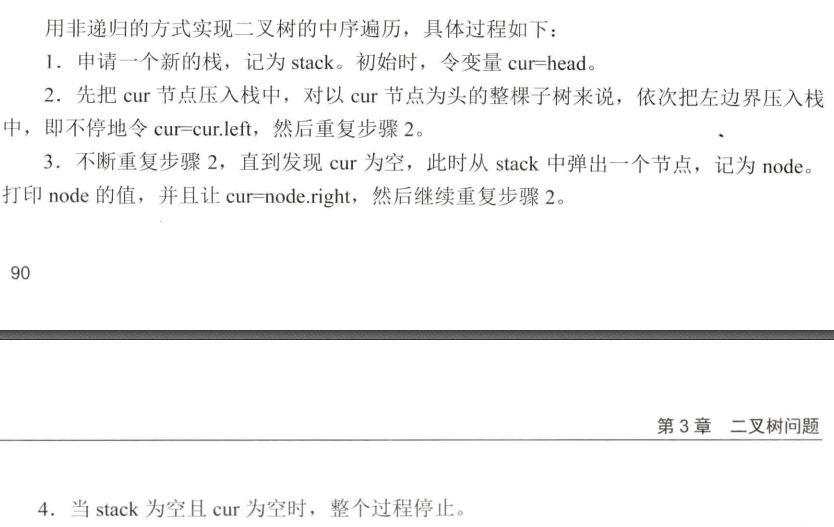时间/空间复杂度分析
时间复杂度均为O(n);空间复杂度平均情况下为O(logn),最坏情况下为O(n).
Morris遍历:时间为O(n),空间为O(1)
一、前序遍历:
递归方式:
def preorder(tree): if tree: print(tree.val) preorder(tree.getLeftChild()) preorder(tree.getRightChild())
非递归方式:时间复杂度O(n),空间复杂度O(n)

def preOrder(head): if not head: return None res ,stack = [] , [head] while stack: cur = stack.pop() res.append(cur.val) if cur.right: stack.append(cur.right) if cur.left: stack.append(cur.left) return res
二、中序遍历:
递归方式:
def inorder(tree): if tree: inorder(tree.left) print(tree.val) inorder(tree.right)
非递归方式:

def InOrder(head): if not head: return None res ,stack = [] , [] cur = head while stack or cur: if cur: stack.append(cur) cur = cur.left else: cur = stack.pop() res.append(cur.val) cur =cur.right return res
三、后序遍历:
递归
def postorder(tree): if tree: postorder(tree.left) postorder(tree.right)) print(tree.val)
非递归:

def PosOrder(head): if not head: return [] s1 , s2 = [head] , [] cur = head while s1: cur = s1.pop() s2.append(cur.val) if cur.left: s1.append(cur.left) if cur.right: s1.append(cur.right) return s2[::-1]


class Node: def __init__(self,value): self.val = value self.left = None self.right = None def posOrder(head): if not head: return [] res = [] cur = [head] while cur: node = cur[-1] if node.left and node.left != head and node.right!= head: cur.append(node.left) elif node.right and node.right != head: cur.append(node.right) else: res.append(cur.pop().val) head = node return res if __name__ == '__main__': tree = Node(5) tree.left = Node(4) tree.right = Node(3) tree.left.left = Node(2) tree.left.right = Node(1) posOrder(tree)
四、层次遍历:
两个栈:
一个栈:
class Node:
def __init__(self,value):
self.val = value
self.left = None
self.right = None
def posOrder(root):
if not root:
return []
last = root
nlast = None
stack = [root]
res = [[]]
while stack:
head = stack.pop(0)
res[-1].append(head.val)
if head.left:
stack.append(head.left)
nlast = head.left
if head.right:
stack.append(head.right)
nlast = head.right
if head == last and stack:
last = nlast
res.append([])
return res
if __name__ == '__main__':
tree = Node(5)
tree.left = Node(4)
tree.right = Node(3)
tree.left.left = Node(2)
tree.left.right = Node(1)
posOrder(tree)
|
 |
0个栈:(DFS)求每层的平均值
#####求每层的平均值 def averageOfLevels(self, root): """ :type root: TreeNode :rtype: List[float] """ def computeSum(root,height,sumlist,countlist): if not root: return 0 if height>=len(countlist): countlist.append(0) sumlist.append(0) sumlist[height]+=root.val countlist[height]+=1.0 computeSum(root.left,height+1,sumlist,countlist) computeSum(root.right,height+1,sumlist,countlist) sumlist=[] countlist=[] computeSum(root,0,sumlist,countlist) return [i/j if j!=0.0 else 0.0 for i,j in zip(sumlist,countlist)]